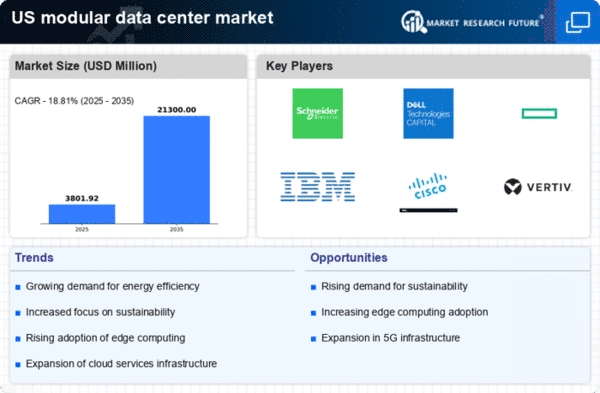Rising Demand for Data Processing
The increasing reliance on data-driven decision-making across various sectors is propelling the modular data-center market. Organizations are seeking efficient solutions to manage and process vast amounts of data. In 2025, the demand for data processing capabilities is projected to grow by approximately 30%, indicating a robust market for modular data centers. These facilities offer scalability and flexibility, allowing businesses to adapt to changing data needs without significant capital investment. As companies prioritize agility and responsiveness, the modular data-center market is likely to experience accelerated growth, driven by the necessity for rapid data processing and storage solutions.
Regulatory Compliance and Data Security
As data privacy regulations become more stringent, the modular data-center market is experiencing heightened demand for compliant solutions. Organizations are required to adhere to various regulations, such as the General Data Protection Regulation (GDPR) and the Health Insurance Portability and Accountability Act (HIPAA). Modular data centers can be designed to meet these compliance requirements, offering enhanced security features and data protection measures. This focus on regulatory compliance is expected to drive growth in the modular data-center market, as businesses seek to mitigate risks associated with data breaches and ensure the integrity of their operations.
Cost Efficiency and Operational Flexibility
Cost considerations are paramount in the modular data-center market, as businesses strive to optimize their IT expenditures. Modular data centers provide a cost-effective alternative to traditional data centers, with initial investments potentially reduced by up to 40%. This financial advantage is particularly appealing to small and medium-sized enterprises (SMEs) that require robust IT infrastructure without the burden of high operational costs. Furthermore, the modular approach allows for incremental scaling, enabling organizations to expand their capacity as needed, thus enhancing operational flexibility. This trend is expected to continue influencing the modular data-center market positively.
Increased Focus on Disaster Recovery Solutions
The growing awareness of the need for robust disaster recovery solutions is shaping the modular data-center market. Businesses are increasingly recognizing the importance of maintaining operational continuity in the face of potential disruptions. Modular data centers offer enhanced resilience and redundancy, which are critical for effective disaster recovery strategies. In 2025, it is estimated that the market for disaster recovery solutions will expand by 25%, further driving the demand for modular data centers. This trend underscores the necessity for organizations to invest in reliable infrastructure that can withstand unforeseen challenges, thereby bolstering the modular data-center market.
Technological Advancements in Cooling Solutions
Innovations in cooling technologies are significantly impacting the modular data-center market. Advanced cooling solutions, such as liquid cooling and immersion cooling, are becoming increasingly prevalent, enhancing energy efficiency and reducing operational costs. These technologies can lower energy consumption by up to 50%, which is crucial as energy prices continue to rise. The integration of these advanced cooling systems not only improves the performance of modular data centers but also aligns with sustainability goals, making them more attractive to environmentally conscious organizations. As a result, the adoption of innovative cooling solutions is likely to drive growth in the modular data-center market.
















